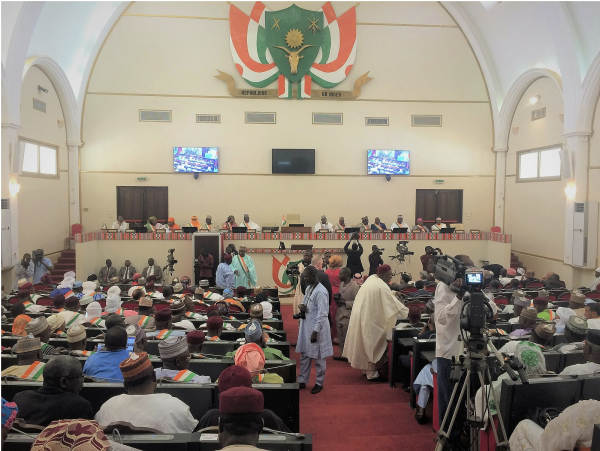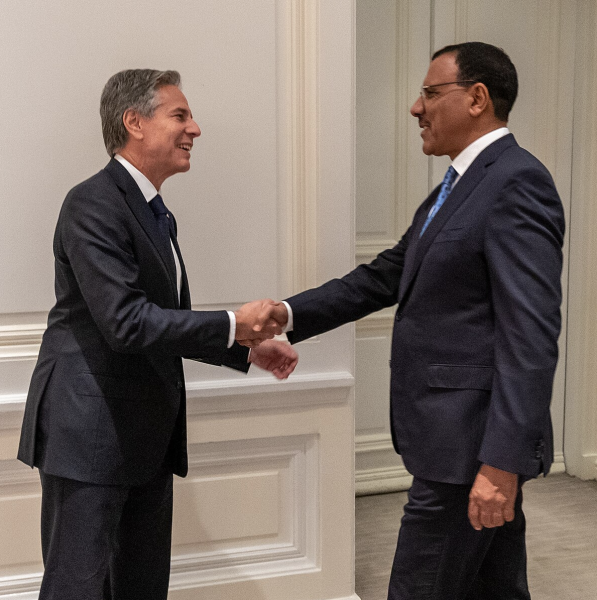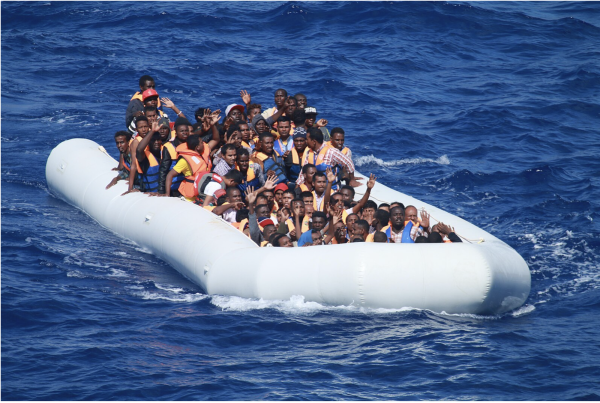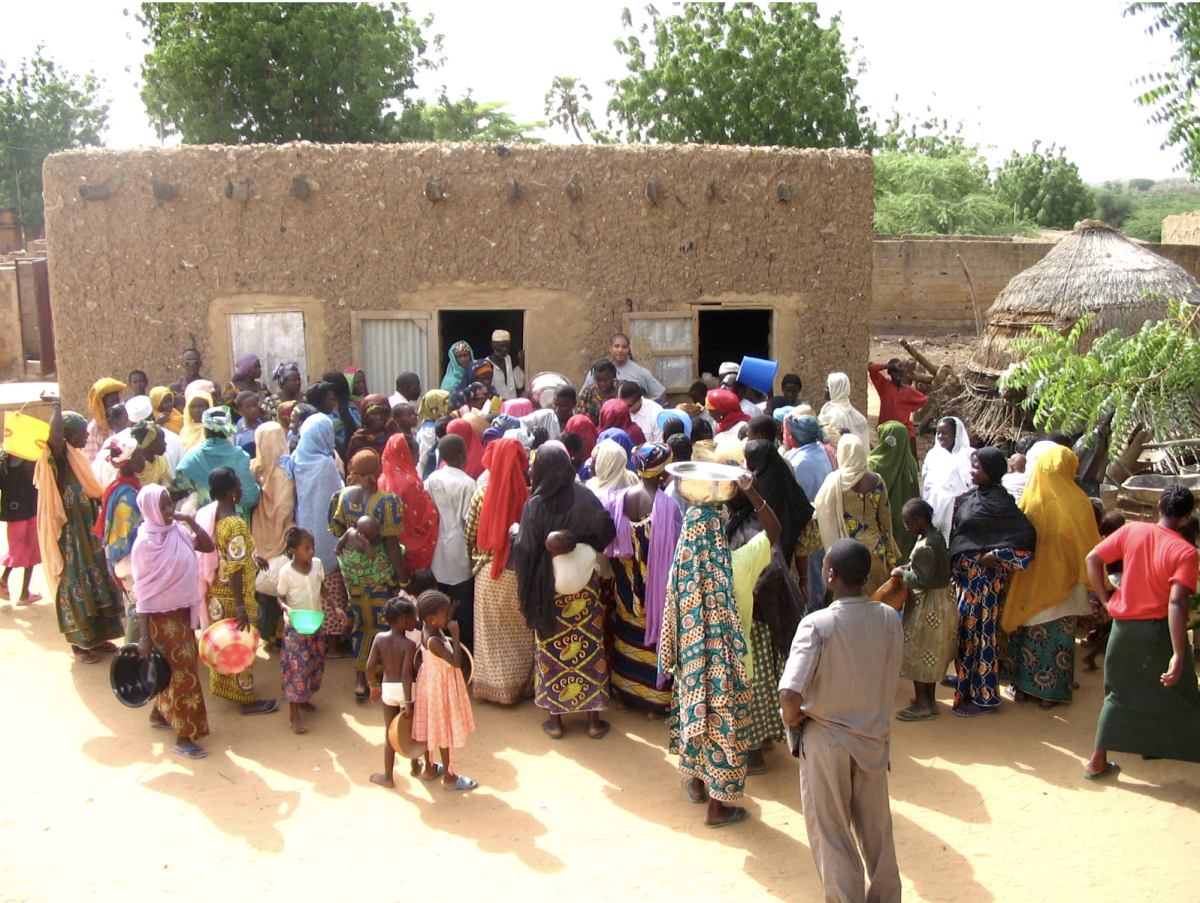With over 200 ethnic groups, 38 languages, and a bustling population of 25 million people, Niger is a testament to cultural diversity. As you walk through Niamey Grand Market, the largest market in Niger’s capital, Niamey, your senses are overwhelmed with the smell of freshly roasted nuts from street food vendors, mingling with the fragrant perfumes and incense offered by local artisans. Looking around, one finds stalls brimming with stacks of vibrant fabrics, intricate handwoven baskets, and beaded jewelry on display.
But while Niger’s markets are filled with sweet treats and treasures, its political scene has quickly soured in recent months.
Niger, officially the Republic of Niger, is located in the middle of Africa’s Sahel region and is the largest landlocked country in Western Africa. For years, Niger had been on a path toward political stability and liberalization, an anomaly within one of the most insecure regions in the world. However, a military coup has undone this progress, plunging the once democratic country into chaos and disarray.
On July 26, 2023, soldiers detained Niger’s President Mohamed Bazoum at his home and declared that they had officially seized power. General Abdourahmane Tchiani, the head of Niger’s Presidential Guard for twelve years and self-appointed leader of the coup, claimed that his soldiers had unseated the president due to his poor management of the economy and the fight against jihadist terrorists in the region. Since coming into power, General Tchiani has suspended Niger’s Constitution and appointed a new transitional body to take charge of executive and legislative powers with himself as the president.
The coup is Niger’s fifth since gaining independence from France in 1960, and it has dealt a fatal blow to the country’s recent stability. Niger only had its first peaceful democratic transition of power in April of 2021, when President Bazoum took office from former President Mahamadou Issoufou.
Part of why countries like Niger are prone to insurrections stems from their colonial history. In Niger, the lingering influence of France, which continued to shape power dynamics, contributed to resentment amongst the military factions that orchestrated the coup. General Tchiani used allegations that President Mohamed Bazoum was a puppet for French interests to legitimize his removal from power and strengthen support for the new regime.
“I think the coup in Niger shows a nuanced duality of the situation because anti-colonial sentiment is very prevalent in the people of Niger which allowed the militants to use this imperialist resentment to their favor,” said Malena Galletto ’24.
Nearly half of Western Africa was under French colonial rule during the late 1800s and early 1900s. Policies that focused on resource extraction, economic exploitation, and the imposition of administrative and legal systems led to many former colonies to remain dependent on France. Today, France has great economic influence in the region due to its many investments, and direct access to heads of state, a web often referred to as “Françafrique.”

Following World War II, French President Charles de Gaulle initiated “la Françafrique,” establishing France’s informal sphere of influence in Africa. In addition to discreetly screening and supporting African political leaders, he laid the groundwork for the French colonies within the African monetary zone. These political zones, which continue to exist today, encompass twelve former colonies—Benin, Burkina Faso, Côte d’Ivoire, Mali, Niger, Senegal, Togo, Cameroon, Central African Republic, Chad, and Republic of the Congo — plus Guinea-Bissau and Equatorial Guinea.
Although President Emmanuel Macron of France vowed in 2017 to decrease French influence in the region, he has continued the tradition of French paternalism. During a speech intended to condemn neocolonialism, Macron said, “[France] only wants to help her brothers and sisters to succeed and to help this African youth to conquer its future.” At the 2017 G20 summit, he told a reporter that Africa’s problem is “civilizational,” implying that there was something inherently ‘wrong’ with the continent.
Cory Satter, a PhD student in Political Science at the University of Florida whose current research explores the role of informal urban actors in climate change adaptation in the Sahel region, contextualized France and Niger’s complex relationship. “France has long been more involved in the affairs of its former colonies than other former colonial powers. France has no doubt exploited Niger. For example, the tiny town of Arlit once powered a third of France, yet the place remains poor, and, after the French company Areva (now Orano) exhausted the uranium mines, it pulled out and left behind a highly contaminated site affecting villagers.”
Niger’s uranium reserves are just one of many ways France continues to assert its dominance over the country. It was ultimately this continued exploitation of natural resources that fueled anti-colonial sentiments. Coup leaders purposefully suggested that France’s influence was the sole reason for Niger’s economic troubles and low standard of living, which could not be further from the truth.
“France’s deeper involvement in its ex-colonies has likely made it a scapegoat. To see this powerful, nuclear-armed country militarily involved in the region without improving the security situation, mixed with this deep mistrust from the colonial past, has created the appearance for many that France is to blame for poverty and instability, and actively working to destabilize the region to gain control over Niger’s resources,” said Satter.
Although Niger’s colonial history is a significant factor in exacerbating its instability, it most certainly is not the only contributor. Niger’s precarious political state is also directly tied to the jihadist presence in the region. The Sahel accounts for 43 percent of the world’s terrorism deaths — more than South Asia and the Middle East and North Africa region combined. There is a growing presence of IS affiliates and Jamaat Nursat Al-Islam wal Muslimeen, a coalition of militant jihadists, in addition to violent groups that are not formally aligned with any terrorist organization. Terrorism in the region has risen over 2,000 percent in the last 15 years with Niger ranking 10th on 2023 Global Terrorism Index, which provides an ordinal ranking of countries on the impact of terrorism.
Until the regime change, Niger played a vital role in addressing such security challenges and combating terrorism, often collaborating with Western countries. Prior to the coup, about 1,100 American troops and 1,500 French troops were stationed in Niger, as well as several drone bases. This military cooperation is now suspended, with France declaring that it will withdraw all of its troops by the end of this year and the United States exerting pressure on the junta to restore democracy.

Satter elaborated, “While Niger may have been a very imperfect democracy under Bazoum, there was still some level of accountability. The military coup has undone that. Militants, including jihadis, tend to thrive in corrupt environments.”
As Western influence wanes in the country, there is also concern amongst political scholars that Niger may begin to align itself with Russia. Many young Nigeriens — and West Africans — see Russia as an anticolonial power, there to help them write a new chapter of national history that has nothing to do with democracy, which many associate with exploitative partnerships with Western countries, corruption, and poverty.
Russian flags have become a fashion statement in the Sahel region as polo shirts, blankets, and dresses are emblazoned with red, white, and blue alongside green, white, and orange — colors of Niger’s flag. This widespread immersion of the Russian flag in Nigerien culture has been traced to Kremlin operations. For instance, Ahmed Bello, the president of a civil society group called PARADE, stated that he distributed up to 70 Russian flags at protests in Niamey because his work was funded by the Russian government through intermediaries conducting similar operations in Mali.
Russia creating a sphere of influence by inserting itself in West African cultures is nothing new. The sudden surge of Russian flags on Niamey’s streets has echoed similar phenomena in neighboring Burkina Faso and Mali, where military-led governments seized power in coups in recent years and then allied with Russia for military cooperation.
In post-coup West African countries, Russia has provided military regimes with security assistance, diplomatic backing, and information operations support. In Mali, Russian military advisors arrived in late 2021, providing the country with a four-hundred-strong contingent of mercenaries to combat jihadist groups through the Wagner Group. In mid-2022, arms shipments were delivered.
Despite the Malian government’s official denial of Russian presence in the country, mounting evidence of Russian mercenary activities and atrocities suggests that Wagner or a similar Russian group is operating there. In spring 2022, Wagner and local military forces conducted an anti-terror operation that resulted in the deaths of approximately 400 civilians. Civilian casualties in the country have risen disproportionately since Wagner’s arrival, and similar trends can be seen across the region.
Alexander Thurston, Assistant Professor of Political Science at the University of Cincinnati, commented on the future of Niger’s international relations: “I think relations with France will remain poor, and I think the U.S. will try to have it both ways — engaging the junta while going through the motions of rejecting them. And the junta may warm up to Russia, although they must certainly be aware that Mali’s path (close, overt ties to the Kremlin, bringing in the Wagner Group, etc.) has been a fraught and costly one.”
Although multiple Western powers including France, United States, and the United Kingdom have denounced the new regime, the most active organization in condemning the coup has been the Economic Community of West African States (ECOWAS). West Africa’s most powerful regional grouping, ECOWAS, represents fifteen countries with a combined population of about 400 million people. Established on May 28, 1975 via the Treaty of Lagos, the organization formed to promote economic trade, cooperation, and self-reliance amongst its member states.
Over time, however, its mission has expanded to preserve stability in Western Africa and ECOWAS has regularly waded into regional conflicts. Its peacekeepers have intervened to help quell rebellions, uphold cease-fires, and force out dictators. The organization’s most recent mission was in Gambia in 2017, where ECOWAS soldiers helped stop former President Yahya Jammeh from overturning an election he had lost.
Thus far, ECOWAS has applied sanctions against the new regime and threatened to use military means to remove it if the new rulers do not hand back power to Bazoum. It has activated a standby force, comprising about 2,700 troops, for a possible intervention. However, Burkina Faso and Mali have asserted they would defend Niger’s junta in the event of a military attack by ECOWAS. Although formally members of the bloc, both countries have been suspended due to being led by their respective military juntas that took power in coups similar to the one that transpired in Niger. Until either coalition takes formal action, the region is at a standstill that is poised to become volatile at any moment.
Satter added onto the future of the junta’s foreign relations: “It is difficult to say what path Niger’s junta government will take in terms of international relations. A lot of this depends on any eventual agreement and détente with ECOWAS, and the West. If the jihadi crisis worsens, as it looks set to, it could provide ECOWAS or France some leverage in negotiations about a transition to civilian rule — if Wagner doesn’t get involved.”
Domestically, the ECOWAS sanctions have caused significant harm to Niger’s civilian population while doing little to nothing to deter the junta’s ambition to maintain control. Over the past few months, more than 70% of Niger’s electricity, supplied by Nigeria, was cut off after financial transactions with West African countries were suspended. Niger’s assets in external banks were frozen and hundreds of millions of dollars in aid were withheld.
“The coup is bad news for people in conflict zones and in food insecure areas. The juntas in neighboring Mali and Burkina Faso have not reined in violence, nor have they halted displacement, school closures, etc. The military regime in Niger will probably perform in a similarly poor way,” Thurston said.
Pharmacies are grappling with depleting essential stocks amid critical public health challenges, including a cholera outbreak. Faced with a dire need for solutions, they are resorting to providing patients with alternative medications due to shortages of the required ones.
Food is also running short. Rising inflation and high food prices are “significantly impacting communities’ capacity to make ends meet,” the U.N. World Food Program’s country office said. The agency said 3.3 million people in Niger were facing acute food insecurity even before the coup. More than 9,000 metric tons of WFP cargo, including specialized foods for the treatment and prevention of malnutrition, destined for Niger and neighboring Burkina Faso remain blocked between Benin and Togo.
For many families, the sanctions strike at the heart of their livelihoods. Approximately one in five Nigeriens are livestock breeders, and the inability to export live animals to Nigeria, valued at $10 million in 2021, has left them urgently seeking alternative markets. Throughout Niger, the prices of basic commodities are skyrocketing. The cost of a 25-kilogram bag of rice, a staple food, has surged by over 50% since the sanctions were first imposed.

However, the coup also has major implications beyond just Niger’s citizens. The United Nations International Organization for Migration (IOM) reported that border closures and airspace restrictions following the coup have disrupted migration patterns, putting hundreds of thousands of migrants and displaced persons at risk.
Niger is a critical crossing in route both for refugees trying to reach Libya as a jumping off spot to cross the Mediterranean to Europe and former refugees who are returning to their homes with help from the United Nations. IOM centers are currently 14% over capacity, placing increased stress on their limited resources, including the availability of food and water.
Before the coup, Niger worked with the European Union in attempts to slow the flow of migrants north to Libya and Algeria. However, following the junta’s suspension of international cooperation with Western forces, this alliance has halted, causing emigration to spiral and overwhelm receiving countries.
Ultimately, Niger finds itself at an unprecedented crossroads, one where it is difficult to predict the outcome. General Tchiani’s coup has undone the hard-won stability that had taken Niger over half a century to achieve, plunging the nation once more into political turmoil. What remains clear is the human impact of the coup, as jihadist terrorist attacks and ECOWAS sanctions exacerbate public health challenges, food shortages, and economic hardships.
“While Niger may have been a very imperfect democracy under Bazoum, there was still some level of accountability. The military coup has undone that. Militants, including jihadis, tend to thrive in corrupt environments,” said Cory Satter, a PhD student in Political Science at the University of Florida.

